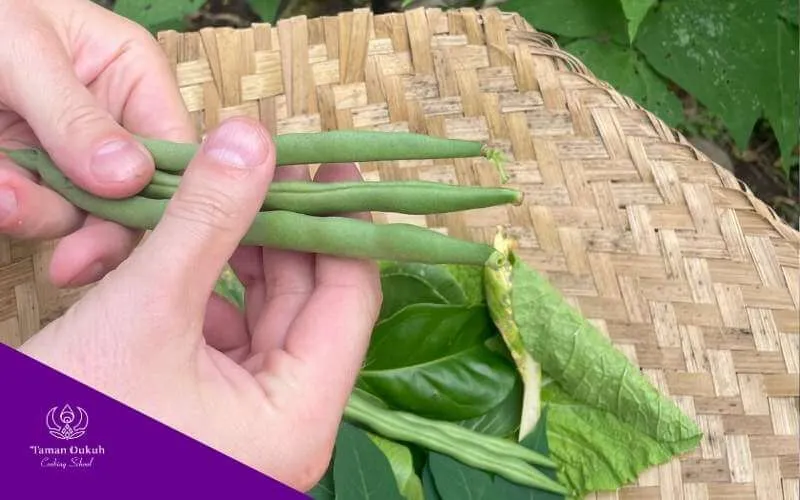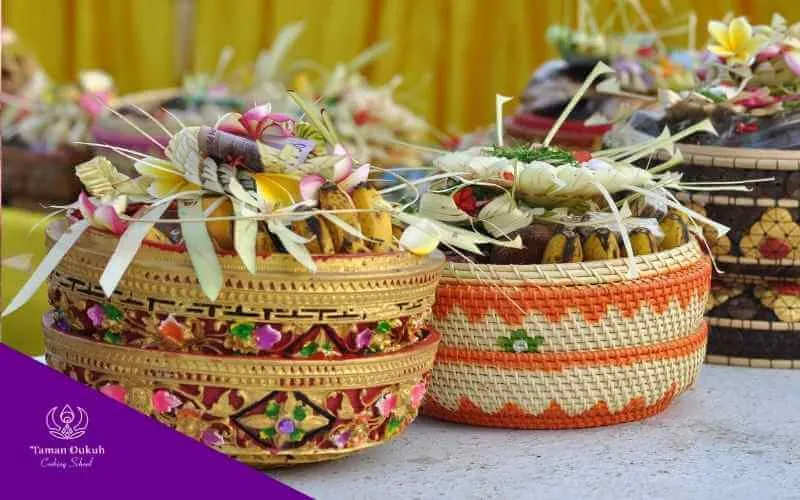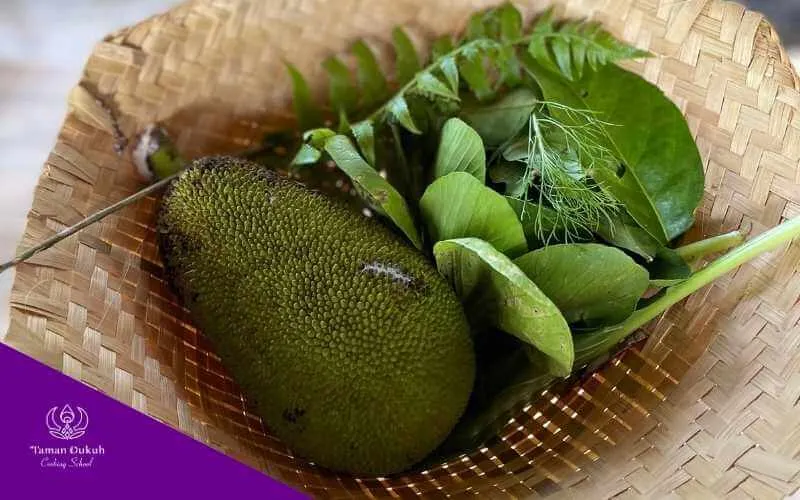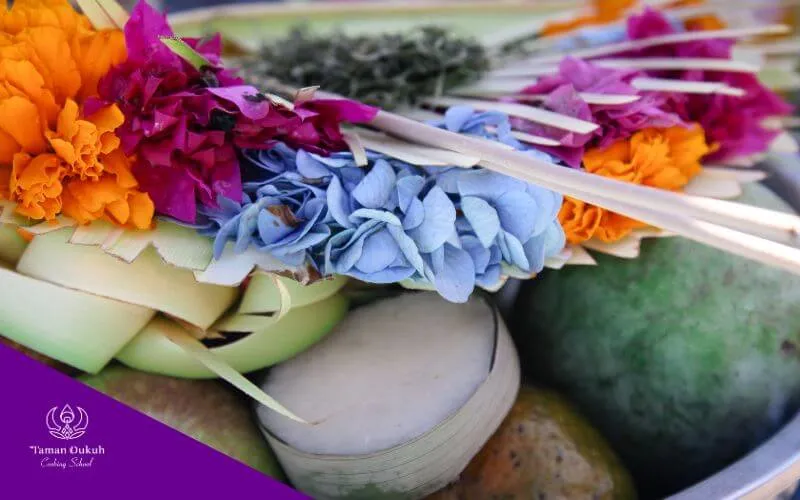Understanding Sukla in Bali: The Sacred Dance of Purity, Ritual, and Reverence in Balinese Cuisine & Culture
Ever wondered about the deeper spiritual currents that shape everyday life and culinary traditions in Bali? There’s a profound philosophy that influences everything from daily offerings to the preparation of grand ceremonial feasts.
Welcome to an exploration of one of Bali’s most fundamental spiritual and cultural principles: the concept of Sukla. This isn’t just a word; it’s a guiding principle of purity, originality, and sacredness that you’ll find beautifully woven into the fabric of daily Balinese existence and the “authentic cultural immersion” we cherish and share at Taman Dukuh.
Understanding Sukla (and its important counterpart, Carikan) offers an “insightful” and truly fascinating glimpse into the Balinese worldview. It reveals a deep-seated respect for ingredients, the profound intention behind rituals, and the continuous pursuit of harmony in all things. It’s a beautiful concept that adds another layer of appreciation and meaning to your Balinese cooking adventure with us, connecting you to the very essence of Balinese food philosophy.
What is Sukla? Unpacking the Core Meanings of Purity, Newness, and Originality in Balinese Tradition
In the rich Balinese language and its intricate cultural context, the term Sukla embodies several vital, interconnected meanings. These all point towards a cherished state of pristine integrity, spiritual cleanliness, and untouched authenticity. Here’s the deal:
Sanctity and Purity (Kesucian dan Kemurnian):
At its very core, Sukla signifies something that is pure, unblemished, and has not been mixed with or affected by anything considered unclean (cemer) or impure.
It’s about actively maintaining a state of spiritual and physical cleanliness, which is paramount in Balinese Hindu practices. This isn’t just about physical hygiene; it extends to the energetic purity of an object or space.
Uniqueness and Originality (Keunikan dan Originalitas):
Sukla also refers to something that is new, unused, or still in its original, untouched state – its first, pristine form.
Think of a freshly picked fruit, perfect and untainted, brought directly from our organic farm – that fruit, in its natural perfection, is considered Sukla. This aspect emphasizes the value placed on the original, unadulterated state of things.

Fit for Ritual and Sacred Offerings (Keterikatan dengan Ritual dan Persembahan):
This is a crucial and highly practical application of the concept. Items, ingredients, or even states of being that are deemed Sukla are considered appropriate, worthy, and indeed necessary for use in sacred offerings (banten) and religious rituals (upacara).
The purity of the offering directly reflects the purity of intention and the depth of respect being shown towards the divine, the ancestors, and the spirits. Using Sukla items ensures the efficacy and sanctity of the ritual.
Now, what about its opposite? The counterpart to Sukla is Carikan (or sometimes lungsuran in the context of food offerings that have been presented and then can be consumed by humans).
Carikan refers to something that is used, leftover, a remnant, or has been touched or consumed in a way that alters its original pure state. For example, rice that has already been eaten by someone, the remaining portion is considered Carikan.
Such items, having lost their original purity or completeness, are generally not considered suitable for offerings to the higher deities, though they might be used for offerings to lower spirits or simply consumed normally. This distinction is vital in understanding the hierarchy and intention in Balinese offering practices.
The Sukla Principle in Balinese Daily Life & Sacred Rituals: A Way of Being
The concept of Sukla extends far beyond just food ingredients. It permeates many aspects of Balinese life, especially those connected to spiritual practices and maintaining cosmic harmony. You’ll see it in action everywhere:
Ritual Utensils and Offering Containers:
Items used for offerings or ceremonies, such as special plates (piring sukla), intricately woven offering trays (bokoran sukla), or glasses and vessels for holy water (gelas sukla for tirta), must ideally be Sukla.
This means they are either brand new, specifically consecrated for ritual use, or have been ritually purified (melukat) and are used exclusively for these sacred purposes, never for ordinary, everyday activities.
This strict separation ensures that the sanctity of the ritual and the purity of the offerings are not compromised by mundane energies.

The Making of Offerings (Banten or Yadnya):
All components of a Balinese offering – from the vibrant flowers and perfectly ripe fruits to the meticulously cooked rice and other food items – should be Sukla.
This involves selecting the freshest, most perfect, and unblemished items available. The act of preparing banten is itself a mindful, meditative practice, ensuring every element is pure, aesthetically pleasing, and offered with sincere devotion and a clear heart. This dedication is a beautiful expression of Balinese traditions.
Personal Purity and Ritual Readiness:
Individuals participating in or preparing for important ceremonies (piodalan, life-cycle rites like metatah or weddings) often undertake purification rituals.
These can range from simple ablutions with holy water to more elaborate cleansing ceremonies, all aimed at achieving a state of personal Sukla, both physically (sekala) and spiritually (niskala). This ensures they approach the sacred in a worthy state.
Maintaining Sacred Spaces:
Temples (pura), family shrines (sanggah or merajan), and other sacred sites are kept meticulously clean and pure. This physical cleanliness reflects the importance of maintaining a Sukla environment, one that is inviting and conducive to the presence of the divine and ancestral spirits.
Essentially, anything associated with religious or cultural rituals in Bali ideally embodies ke-sukla-an – the inherent quality or state of being Sukla. This principle underscores the Balinese commitment to offering their very best to the divine and maintaining a respectful, harmonious relationship with the spiritual world. It’s a fascinating aspect of Balinese cultural history and living tradition.
Sukla in Authentic Balinese Cuisine: The Reverence for Ingredients and Preparation
In the realm of authentic Balinese cuisine, especially when food is prepared for sacred offerings or to honor esteemed guests, the Sukla principle is paramount. It dictates not just what is cooked, but how it is sourced and prepared.
Here’s how this reverence manifests:
Freshness Directly from the Source:
Ideally, ingredients for important meals and offerings are sourced directly from the family garden, local fields, or the morning market, ensuring they are as fresh, vibrant, and “new” (in the sense of recently harvested) as possible.
This is why the seed-to-plate journey we celebrate at Taman Dukuh resonates so deeply with this traditional Balinese value. When you “pick your own veggies” from our organic farm in Ubud, you are handling ingredients that embody the Sukla ideal.

Emphasis on Wholeness and Perfection:
For offerings, fruits and vegetables are often chosen for their unblemished appearance, perfect form, and vibrant color, symbolizing completeness, purity, and the best nature has to offer. Imperfect items might be used for everyday consumption but not for sacred presentation.
Mindful and Pure Preparation:
The Balinese cooking process itself, especially for ceremonial food (bebantenan), is undertaken with a sense of mindfulness, focused intention, and physical/spiritual cleanliness on the part of the cook. The kitchen space (Paon) is often cleansed, and the cook may observe certain abstinences or perform small prayers before beginning.
The Sacred Daksina Offering as a Prime Example:
A prime example of Sukla in practice is the Daksina offering, one of the most sacred and complex forms of banten in Bali. Each component within the Daksina – from the specific type of rice and the whole, unpeeled coconut to the duck egg, fruits, and various symbolic leaves – is carefully chosen for its profound symbolic meaning and its inherent Sukla quality.
Together, these elements represent the cosmos, life’s essential elements, and the Trimurti (Brahma, Vishnu, Shiva) in their purest form.
(This connects to the deeper meanings we can explore on a dedicated Daksina page, or on our Sacred Balinese Kitchen page).
This deep reverence for ingredients and the preparation process ensures that food offered to the gods, ancestors, or honored guests is of the highest possible quality, both physically and energetically, embodying respect and sincerity.
The Deeper Philosophy: Sukla, Cosmic Order, and Harmony with Life
The concept of Sukla is not merely about external cleanliness or the newness of an object; it reflects a much deeper Balinese understanding of life, cosmic order (Rta), and the interconnectedness of all things.
It beautifully connects to the idea of respecting the Panca Maha Bhuta – the five great or gross elements (earth, water, fire, air, and ether/space) from which all life, including our food, originates.
By ensuring that ingredients and offerings are Sukla, there’s an inherent act of respect and gratitude towards these life-giving elements and the divine forces that govern them.
Furthermore, the principle of Sukla extends powerfully to personal conduct and inner purity. Striving for “purity of thought (manah), purity of speech (wak), and purity of action (kaya)” – which forms the core of the Tri Kaya Parisudha ethical philosophy – is seen as cultivating an inner state of Sukla.
This inner purity is considered just as important, if not more so, when engaging in sacred activities, including the preparation and offering of food. It’s about approaching life and its myriad rituals with a clear heart, sincere intentions, and a mind free from negativity, always aiming for a harmonious existence.
This resonates strongly with other core Balinese philosophies like Nyegara Gunung, which emphasizes balance between the mountains and the sea, and the overarching concept of Tri Hita Karana (harmony with God, humans, and nature).
Experience the Spirit of Sukla in Your Balinese Culinary Journey at Taman Dukuh
While you may not be preparing grand temple offerings in our Ubud cooking classes, the spirit of Sukla deeply informs and enriches our entire approach at Taman Dukuh.
Our unwavering commitment to using the freshest seasonal ingredients, often picked just moments before use from our pristine organic farm, directly reflects this profound reverence for purity and originality.
What does this mean for you? It means you’re working with ingredients at their peak vitality.
When you learn with our “friendly and passionate” Balinese chefs, you’re not just learning Balinese recipes; you’re experiencing a culinary tradition where every ingredient is valued, every step is mindful, and every dish is prepared with intention.
Understanding the Sukla concept adds a beautiful and meaningful layer to your “amazing” and “authentic” Balinese culinary adventure, connecting you more deeply to the island’s rich culture and the true “soul behind” its incredible food.
Or join one of our hands-on cooking classes!

